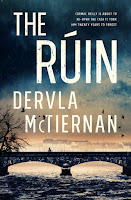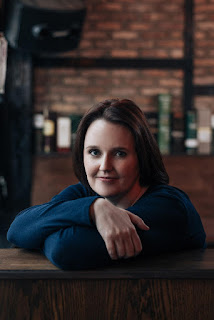The Rúin is a page-turning crime thriller that tackles dark aspects of Ireland's recent history. It has an authentic sense of place and people, coupled with a wonderfully gloomy, moody atmosphere of moral decay. This is a noir thriller sure to please crime aficionados, and even those who aren’t.
To view the latest edition of the North Melbourne Books newsletter, click here. To sign up for our monthly newsletter, click here.
North Melbourne Books talks to Dervla McTiernan
North Melbourne Books: When investigator Cormac Reilly is stationed at a new police station, he is thrown back into an old case from twenty years ago involving two children whose mother died of an overdose. Now the children, grown adults, are possibly the victims of another crime. As Reilly re-opens an investigation into their mother’s death, he is plunged back into some of the uglier aspects of Ireland’s past – drugs, poverty and the abuses of the church. The Rúin has a soul searching tone, as it tries to fathom black spots in Ireland’s recent history.
What does the novel mean to you?
Dervla McTiernan: I heard Don Winslow being interviewed by Kate Evans recently. He was talking about his novel The Force, and he said that in writing The Force he didn’t set out to write a cop novel, he set out to write a New York cop book. I suppose that stuck with me. When I set out to write The Rúin it wasn’t in my mind to examine any particular social issue. I just wanted to write a great story. But the decision to set it in Ireland inevitably brought with it a whole context. You used the term soul-searching and that is what I found myself doing as I wrote the book.
I grew up with a great love of my country, and great pride in my nationality, but the reality is that the same country that gave me a happy, stable childhood allowed for institutionalised neglect and abuse of thousands of children over many decades. I’ve struggled to get my head around that, struggled to understand why good people allow terrible things to be done in their name. I think in a way that is a universal question, not just an Irish one. And in the novel I found myself coming back to that question, trying to find an answer to it. I think I understand it now, or at least I have my own theory about it, though I certainly didn’t find a solution.
NMB: Your characters are very believable and psychologically complex. How did you get such an authentic tone for your characters?
DM: Thank you! For me a book starts with the characters. I usually have a very strong feeling about at least one character in a possible story before I know that I have something that has the potential to become a novel. If I have one character I feel strongly about, then I will sit down and start working on the other characters before I do begin to outline or even begin to start writing scenes. I really need to understand who the characters are before I start working on the book. A really well-developed character feels like a real person to me when I’m writing, and they’ll almost write the book for me. Whereas, if I haven’t done enough work the character feels wooden, and will stop the story in its tracks.
NMB: You’ve said the story started as a single image: a brother and sister sitting together, holding hands, on the stairs of a crumbling Georgian house. It’s such a simple idea, yet the novel is so layered and multi-faceted, with a wide cast of complex characters. What was the writing process like?
DM: The Rúin is my first novel, so the process of writing it was a little all over the place! I think I took that old maxim about terrible first drafts a little too seriously. My first draft really was awful. I had no process, and just started with a blank page and an idea, and kept going until I got to the end. I could tell in reading it that it wasn’t very good, but I struggled to pinpoint exactly what was wrong. I had so much to learn! I went to writing workshops here in Perth, which helped, but I also learned so much from reading books on the craft of writing, and then re-reading my favourite authors and trying to understand how they do what they do. For the second draft I scrapped 90% of my draft and started again. For the third draft I think I only scrapped about 40%, so that was progress! I kept going like that, scrapping and rewriting until it started to feel a little bit more like something worth submitting.
NMB: The Rúin is a very accomplished and technically assured first novel. Are there any writers who you count as influences?
DM: Thank you, that’s very kind of you. I think every writer I’ve ever read has influenced me to some degree. It’s quite difficult to think of writers that have directly influenced my writing, possibly because the writers that first come to mind are all quite different. I am a big Tana French fan – she commits so completely to her characterisation so that every book has a very distinct voice, and each voice is so utterly convincing. She also knows how to tell a great story! And then there’s Michael Connelly. I think it’s the clarity of his writing that makes it special, something I didn’t fully appreciate until I started writing myself. There are times as a writer when you think you know what you want to say, but you haven’t fully and completely examined the thought or the idea, so the writing is muddy. It takes work and revision to fully understand what it is you are trying to say and get that idea firmly on the page, and Michael Connelly makes that seem effortless. Those are just two of the many writers I admire and whose work I think about a lot. In terms of technical approach, the writer who has influenced me most is Elizabeth George. I read her book Write Away (her book on craft) for the first time a couple of years ago, and was a bit intimidated by it. Her writing process is so complete, and she does so much up-front work before she ever puts her fingers to the keyboard to write a scene, that I thought initially that I wouldn’t have time for it. But I found myself coming back to Write Away again and again, and by the time I was writing my second book, this time on a deadline, I found that I really didn’t have the time not to do that work. I would say I’ve adopted at least 70% or more of her process and most of it is so embedded into the way I work that I don’t even think about it anymore.
NMB: What books are you enjoying reading at the moment?
DM: As usual, I have a few on the go! I’m reading Alex Gray’s Still Dark, which is dark and atmospheric and brilliant. For research I’m reading Forensics – The Anatomy of a Crime, by Val McDermid, an absolute must read for any writer of crime fiction. On audio I just finished Force of Nature, which was brilliant, and I’ve just started Jane Casey’s The Last Girl. I very belatedly discovered Jane Casey last year, so I’ve been catching up on her Maeve Kerrigan series, and loving it. The Book of Dust (Philip Pullman) and Sleeping Beauties (Stephen and Owen King) are top of my to be read pile after that.
The Rúin, by Dervla McTiernan. Published by HarperCollins. RRP: $32.99


No comments:
Post a Comment